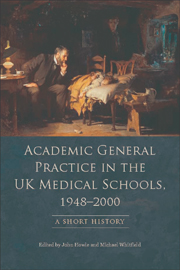Book contents
- Frontmatter
- Contents
- Preface
- Acknowledgements
- Abbreviations
- Timeline
- Introduction
- Dedication
- 1 The University of Aberdeen
- 2 The University of Dundee
- 3 The University of Edinburgh
- 4 The University of Glasgow
- 5 The Cardiff University School of Medicine
- 6 Academic General Practice in Ireland
- 7 The University of Birmingham
- 8 The University of Bristol
- 9 The University of Cambridge
- 10 The University of Exeter
- 11 The University of Leeds
- 12 The University of Leicester
- 13 The University of Liverpool
- 14 The University of Manchester
- 15 The University of Newcastle
- 16 The University of Nottingham
- 17 The University of Oxford
- 18 The University of Sheffield
- 19 The University of Southampton
- 20 The London Medical Schools
- 21 The University of St Andrews
- Appendix 1 Primary Care in the New Medical Schools
- Appendix 2 The SIFT/ACT Negotiations
- Appendix 3 An Overview
- Appendix 4 And Finally…
- Index
6 - Academic General Practice in Ireland
Published online by Cambridge University Press: 05 August 2013
- Frontmatter
- Contents
- Preface
- Acknowledgements
- Abbreviations
- Timeline
- Introduction
- Dedication
- 1 The University of Aberdeen
- 2 The University of Dundee
- 3 The University of Edinburgh
- 4 The University of Glasgow
- 5 The Cardiff University School of Medicine
- 6 Academic General Practice in Ireland
- 7 The University of Birmingham
- 8 The University of Bristol
- 9 The University of Cambridge
- 10 The University of Exeter
- 11 The University of Leeds
- 12 The University of Leicester
- 13 The University of Liverpool
- 14 The University of Manchester
- 15 The University of Newcastle
- 16 The University of Nottingham
- 17 The University of Oxford
- 18 The University of Sheffield
- 19 The University of Southampton
- 20 The London Medical Schools
- 21 The University of St Andrews
- Appendix 1 Primary Care in the New Medical Schools
- Appendix 2 The SIFT/ACT Negotiations
- Appendix 3 An Overview
- Appendix 4 And Finally…
- Index
Summary
Two of the original twenty-nine departments of general practice which came to constitute the AUTGP were based in Ireland, one at Queen's University Belfast (QUB) and the other at Trinity College Dublin (TCD). Over the years, cross-border collaboration led to the institution of the Association of University Departments of General Practice in Ireland (AUDGPI) in 1997. The ‘Ireland story’ presented in this chapter describes the early days of each department separately, followed by some reflections on how the partnership between them has now been formalised.
Queen's University Belfast
In 1958, Professor John Pemberton, epidemiologist and founder of public health medicine, was appointed to the chair of social and preventive medicine at QUB. He spent time every summer as a locum with Will Pickles in the Yorkshire Dales, before retiring in 1976. He believed that medical students should be taught in general practice to see the influence of psychosocial factors on clinical decision-making and observe disease at an early stage as well as the management of chronic illness. In the early 1960s he arranged for students to visit general practices.
Pemberton wanted to create a teaching health centre close to the medical school, and was supported in this by the then Dean Sir John Henry Biggart. George Irwin was appointed to a part-time lectureship within Pemberton's department to develop teaching and research in primary care, laying the foundations for a future chair in general practice. In 1968, the General Health Services Board Northern Ireland offered £59,000 to the university to establish the chair, and more funding came from other sources.
- Type
- Chapter
- Information
- Academic General Practice in the UK Medical Schools, 1948-2000A Short History, pp. 23 - 30Publisher: Edinburgh University PressPrint publication year: 2011



